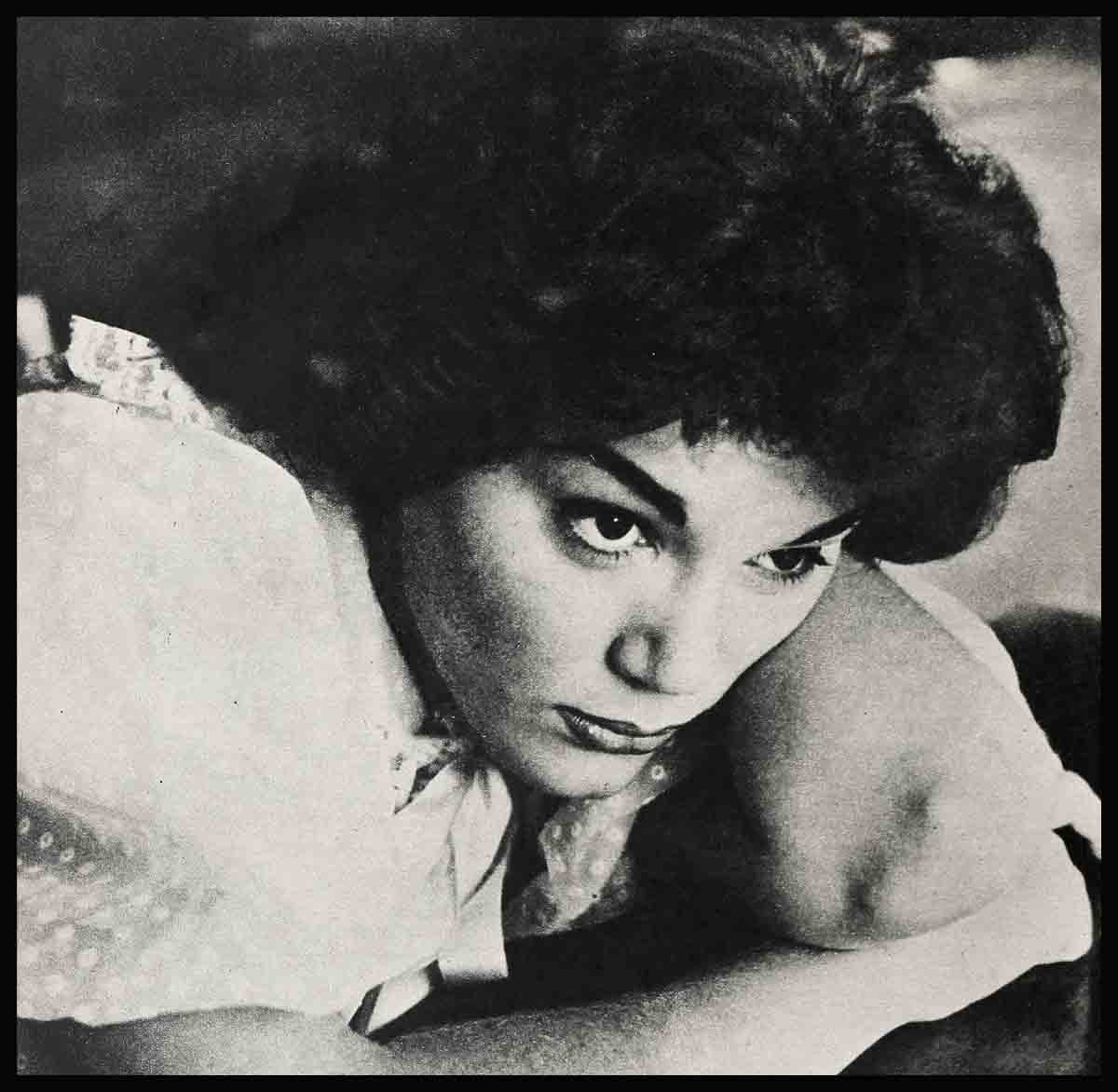
Chasing The Blues Away—Connie Francis
Songstress Connie Francis is, without doubt, one of the most popular girls in America today. Just turned 21, she’s a petite, dark-eyed beauty whose vivacity and charm would make her the belle of any social setting even if she never sang a note.
But Connie does sing. On records, radio, television. Ballads and rock ’n’ roll; old songs, pop favorites and tunes written just for her. She’s the new darling of the night club set and the continuing femme favorite of the teenagers. Schools play her recording of “God Bless America” in assemblies, and kindergarteners dance to her new album of children’s games. She’s the girl that boys would most like to date and the star to whom other girls write asking advice on personal problems: She receives hundreds of letters a week which begin, “Connie, you’ll understand . . .”
Can such a girl ever get lonely? Can she sit right down in the middle of a room and feel that an ocean of nothingness separates her from those she loves? Dashing through a daily schedule where every minute is booked, can she feel that she is all alone in a crowd and that no one cares?
“It’s impossible.” is the obvious answer. But ask Connie and she gives you a level gaze from those eloquent brown eyes and says, “Are you kidding?” And then, “Just look at the collection of stuffed animals that I have . . .”
That bright-colored cloth menagerie crowds Connie’s own room in her new house in New Jersey. “I started that collection on a day when I felt so lonely I could die.”
She was just 1614 years old, she explains. She had been graduated from Belleville, New Jersey, High School that June, and during graduation week had won both her first MGM recording contract and a scholarship to New York University. During the middle of the Fall term, her recording. “Freddie”, gained popularity around New York and the company sent her out on a weekend promotional tour which stretched to three full weeks.
“It was.my first time on a train, my first time away from my family. I was excited, of course, but underneath, I started getting homesick as soon as I kissed my folks goodbye.”
Her companion on the road was Janie Gibbs. Janie had formerly lived in Chicago and when they reached there, it was old home week. “She knew everyone, so we made our rounds quickly and had an afternoon free of appointments,” Connie explains.
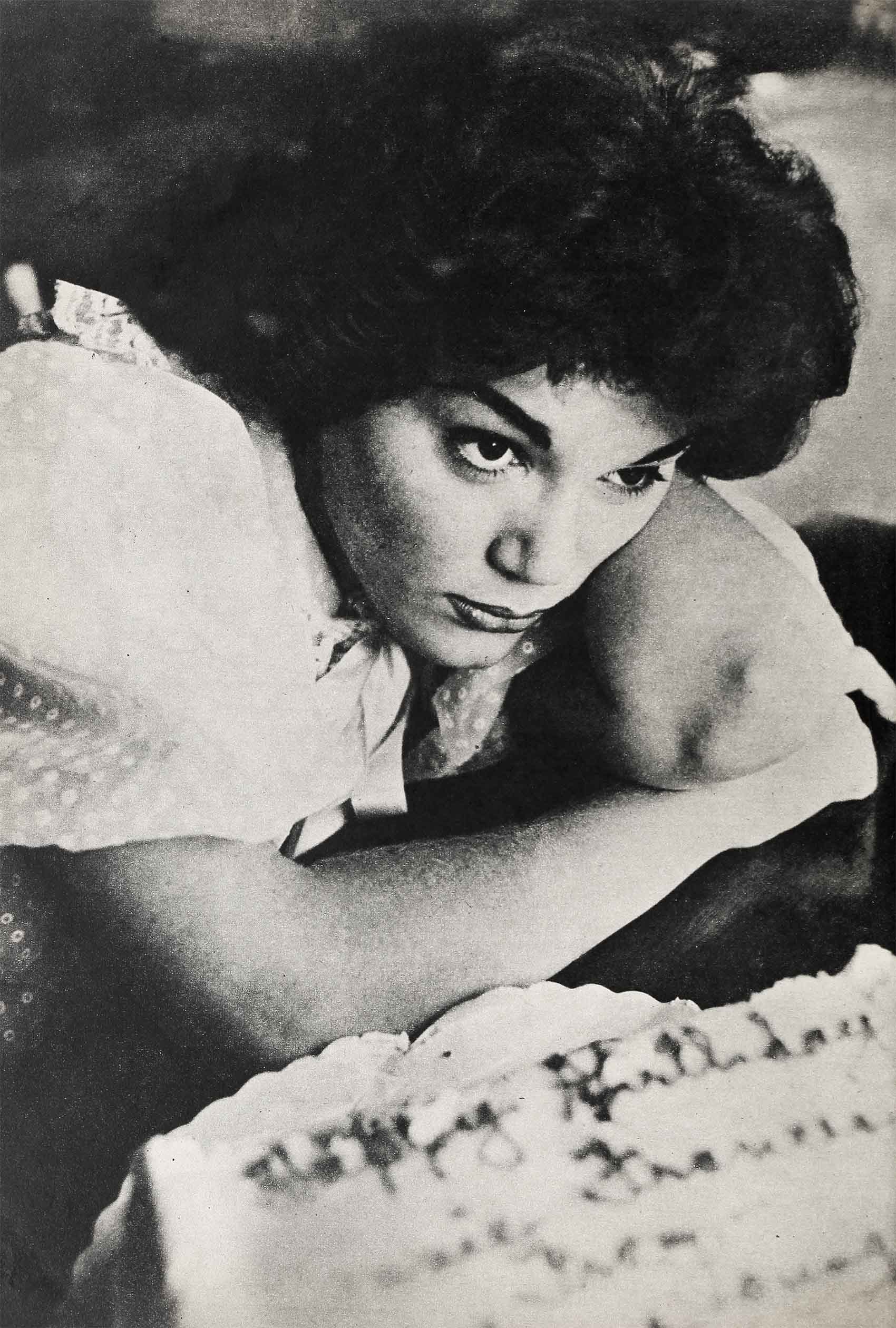
Janie chose to spend it with Fran Allison. Connie declined the invitation to go along. “I was a fan of ‘Kukla, Fran and Ollie’ and I thought Fran’s Aunt Fannie on ‘The Breakfast Club’ was terrific. but I knew she and Janie would have lots to talk about and I didn’t want to get in the way.”
For the first time in her life, young Connie was all alone in a hotel room. Soon, she was treading that solitary path which is heartbreakingly familiar to every girl who has gone away to school or has moved to a distant place to find her first job. “I read for a while. I looked out the window. I wrote a letter to my folks. Then I looked out the window some more.”
Restless, solitary, she realized she had better find something to do. “I knew how to get to Marshall Field’s. I spent hours prowling through every inch of that beautiful store looking at things I couldn’t buy.”
Wherever she wandered, she kept returning to a certain display which featured a big, silken white Persian cat. “It looked so real I wanted to reach out and pet it. I wondered how much it cost. I was sure it must be at least a hundred dollars. About my third time around, I got up my nerve to ask. And what do you think the girl told me?” The suspense of that moment again came into Connie’s voice. “$4.95!”
Clutching the cat, Connie hurried back to the hotel. “I had already named it ‘Precious’. I held that toy cat in my arms and talked to it while I watched television. I remember I said, ‘It’s doggone lonesome on the road, Precious. But soon we’ll be going home and you’ll sit right in the middle of my bed and be waiting for me each time I go away.”
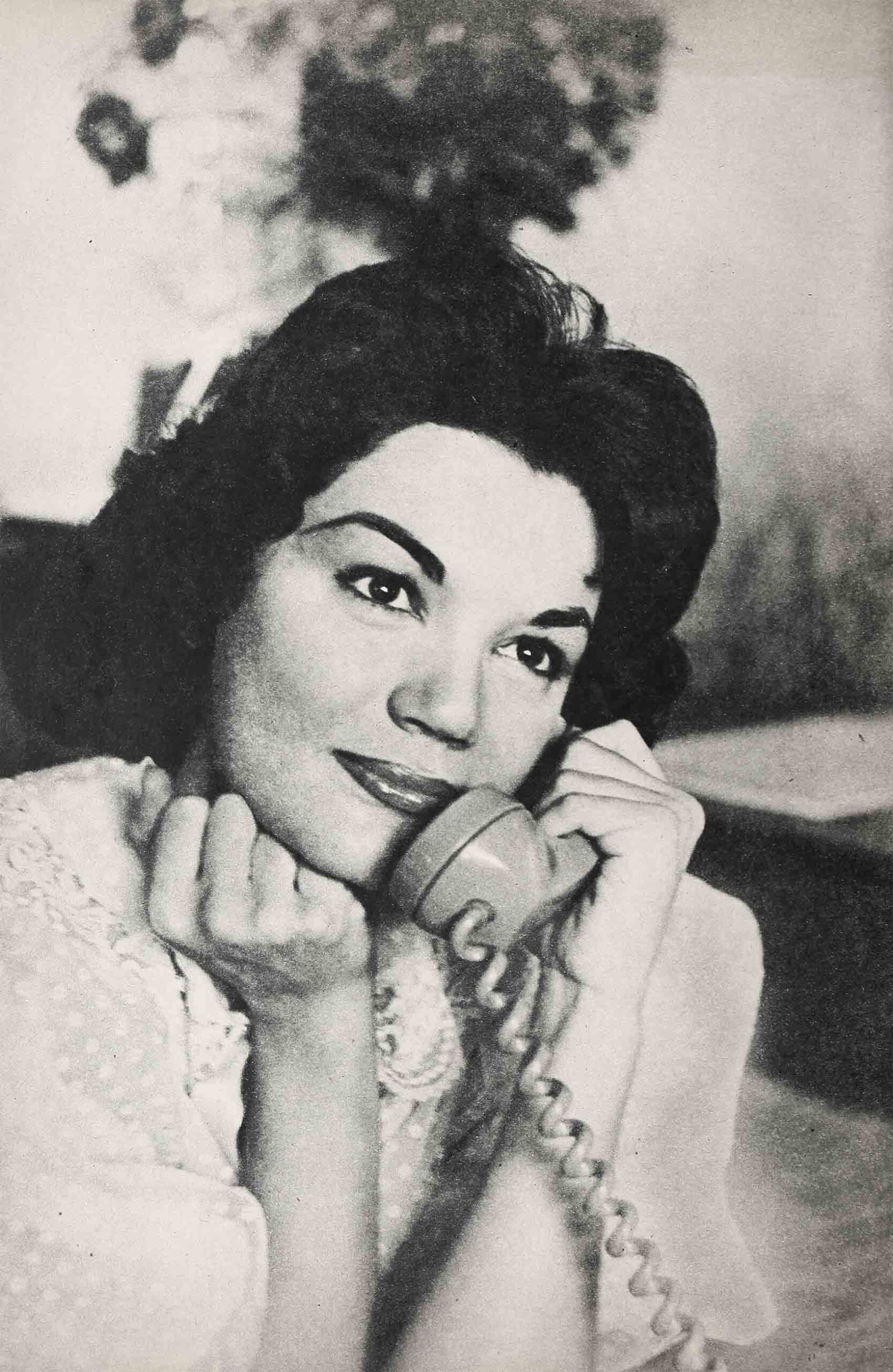
Connie has since made such shopping expeditions a habit. “As soon as I get into a new town and have a few minutes free, I go to the biggest store and buy the prettiest stuffed animal I can find. I know it is going to be part of my home a sort of symbol of all the things I love, and then I’m not lonely any more.”
Having the sound of home with her when she is distant is another of Connie’s ways of bridging the miles. “I carry a tiny radio with me everywhere I go. Now, on long trips, I also take a light-weight phonograph and a few favorite records. Pop music, to me, means family. I hear a song we like and I think of all the times my mother and father and brother and J have sung it together. With our music in the background, I can answer my fan mail and get on with my other little jobs and be quite content, wherever I am.”
Those are ways of keeping old ties close, but what does she do when she meets new people in new places? Many of the letters girls write to Connie carry the question, “How can I make new friends?”
Here Connie holds firm opinions. “First, you have to recognize the difference between acquaintances and friends. I was lucky enough to find out early, and to me, it was the best lesson that I learned in high school.”
Connie had joined a sorority, and having no sister of her own, was, she admits, a bit starry-eyed over the promised organization kinship. Then, one day, some gossipy girls dissected an absent member.
Connie stood up in the meeting and resigned. “If you say such things about her, what will you say about me when I’m not here? I don’t dig this. You’re not my sisters.”
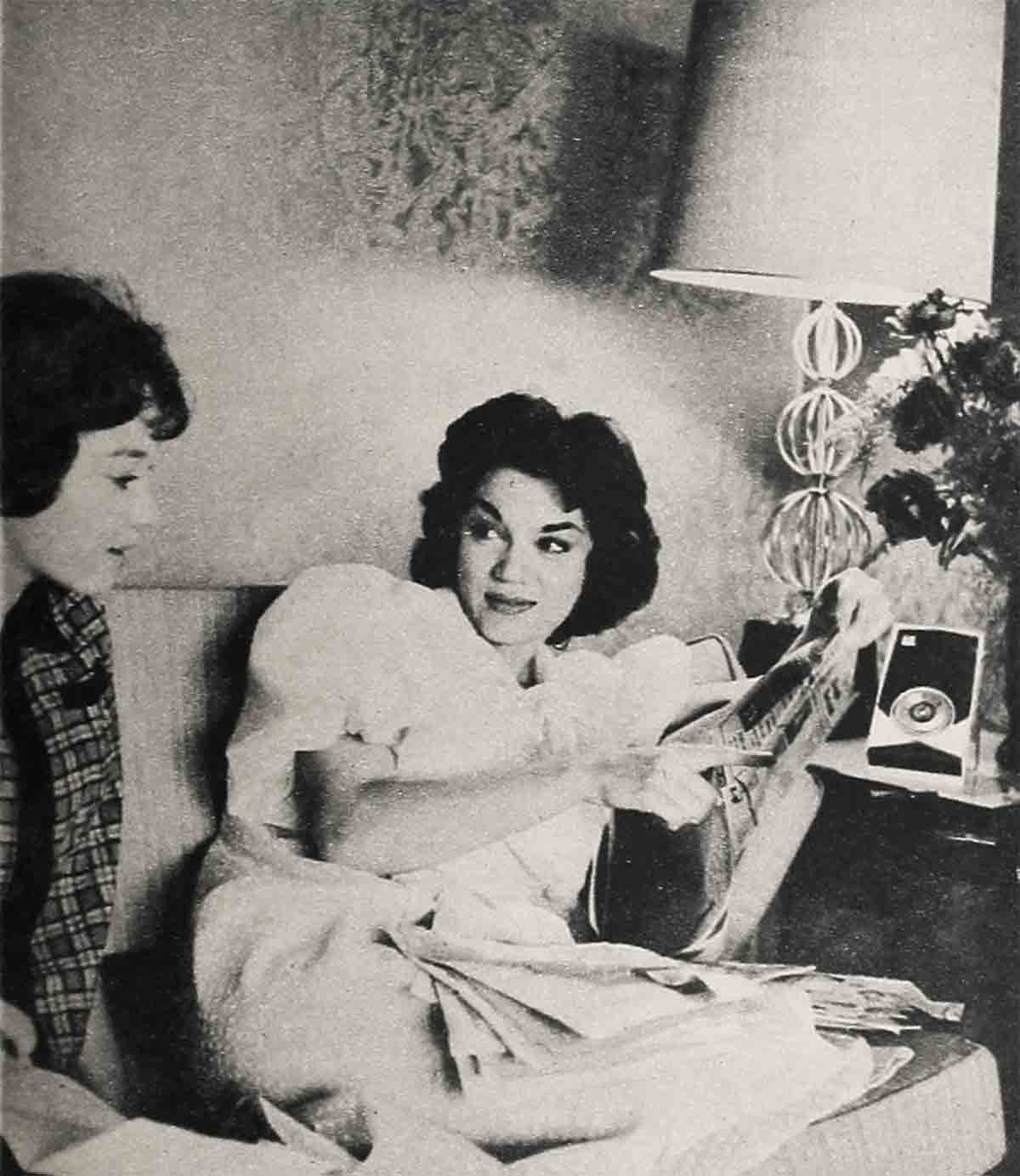
Connie observes, “I learned that I want many acquaintances, but that I’m able to count on just a few close friends. I don’t care how well-adjusted and out-going a person is, you can’t like everyone and not everyone is going to like you. You’re bound to find you are more comfortable with some, people than with others.”
Connie has learned to find those potential friends by being approachable. “For me, this wasn’t easy. I had plenty of friends in my home town, but out on tour I felt I had to be stand-offish with strangers. It is too easy to get talked about. People are quick to call a girl singer a tramp. Usually my mother was with me, and I automatically turned down any invitation which did not include her.”
For an entertainer, there’s always a letdown after a show. When the evening holds nothing more than the prospect of going back to the hotel and having dinner alone, the blues can hit.
They hit Connie near the end of her first Honolulu engagement. “After my performance I started to take off my makeup. Instead, I found myself simply staring into the mirror and thinking, So this is glamour. So this is show business. Back home, girls I know are out on dates with boys they like. They’re laughing. They’re having fun. I’m all alone.”
There was a knock on her dressing-room door. A Hollywood actor who was in the troupe stuck his head in and asked, “How’s about having dinner with me tonight, Connie?”
Automatically, Connie replied, “Thank you, but I just couldn’t.” Her tears weren’t very far from the surface.
Instead of leaving, he stepped in and closed the door. “He really read me a lecture,” Connie recalls. “He reminded me that we had worked together for a week and I should have some idea of what kind of person he was. He reminded me, too, that all men weren’t wolves and that it was time that I learned to trust my own judgment. He said that if I insisted on building a wall around myself, not many people were going to take the trouble to try to get past it.”
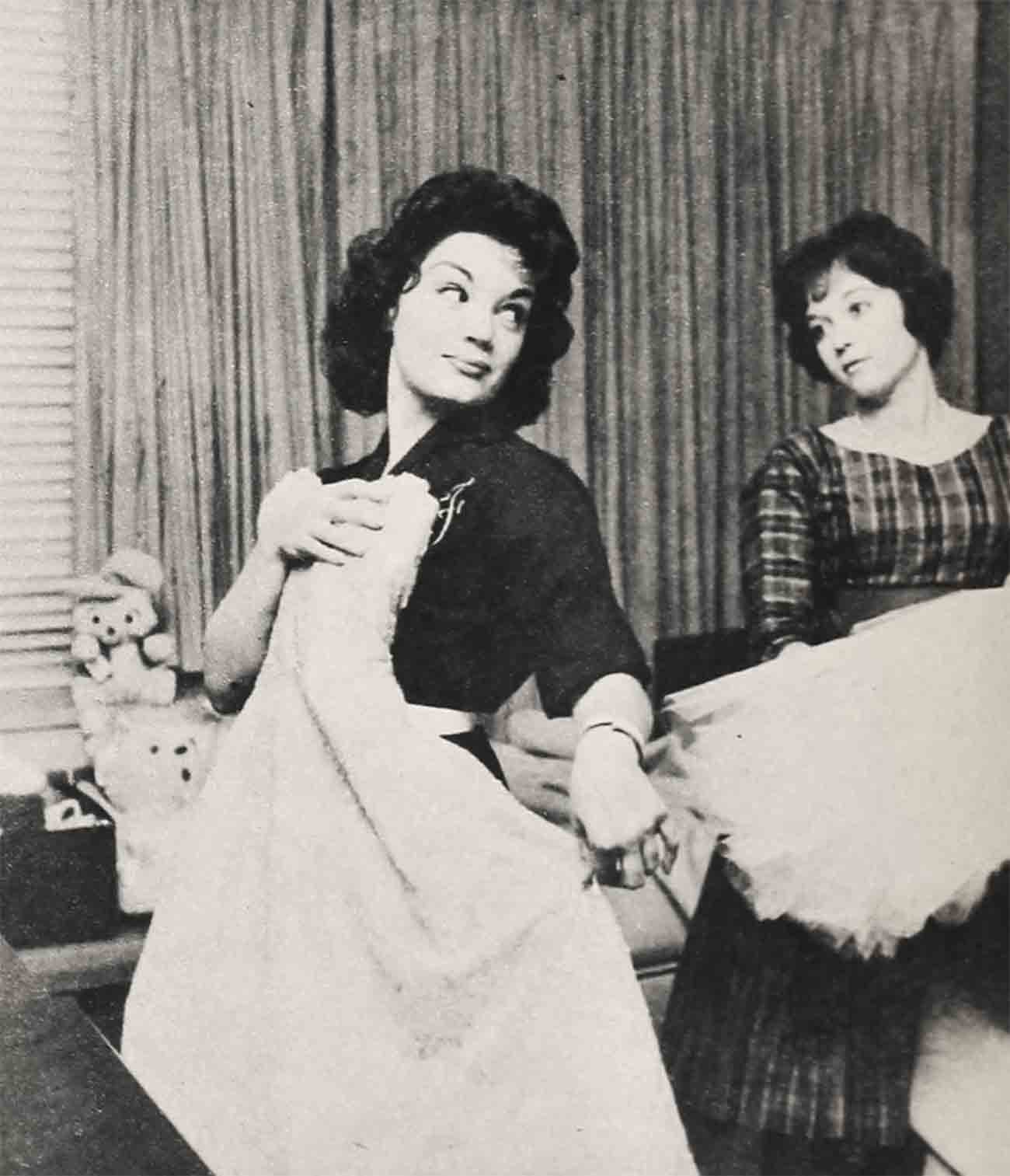
Connie sums it up. “We went out to dinner; he took me swimming the next day, and I had a wonderful time during the rest of my stay. If he’s East, or I’m on the Coast, we still see each other. We’re friends. He made me see that if you want friends you have to be approachable.”
Many girls, Connie feels, block the way to friendship by being too quick to want to go steady. “A girl can spend all her time with one boy, and, if there’s a break-up, she’s all alone again. It’s fun to have boy friends.”
She cites her own friendship with Frankie Avalon and Neil Sedaka. “We’re all too busy and too ambitious right now to get serious. But they entertain me at their homes and they visit mine. We sit around the piano and sing together and it’s the greatest.”
Connie has her own version of that old adage, “To have a friend is to be one.” She says, “As well as being approachable, you have to pay attention to others. I’ve learned that people like to hear from me, even if I have nothing more to say than hello. Now, wherever I am, I keep that phone busy.”
Another of Connie’s bits of wisdom has to do with having faith that your friends will think about you. She learned it, she says, “on what started out to be the loneliest birthday of my life.”
Connie had planned that her 20th birthday was to be a big, beautiful milestone. “I wanted to be home and have a party with a birthday cake and presents and all the trimmings.”
Accordingly, she asked her manager, George Scheck, to accept no bookings for that week. She yielded when the owner of Holiday Inn, near Pittsburgh, marked the upswing of her first popularity by offering her the highest fee that she had yet been quoted.
December 12 came and so did loneliness. Connie says, “My mother was with me and Mr. Scheck was, too. I knew they would do something about my birthday, but it couldn’t be the celebration I had wanted. I was so unhappy I wondered how I could ever finish that second show!”
Engrossed in her own woe, she failed to notice that her mother, her manager and the club owners were as smug as a trio of canary-eating cats. “I came offstage and they didn’t even let me get to the dressing-room. They took me around to a private dining room and threw open the doors. There was a cake, blazing with candles. And every entertainer then playing Pittsburgh was there. I had been the adoring fan for some of them, and I had thought they didn’t even know I existed. Talk about a party! There couldn’t have been a happier way for me to bow out of my teens and feel that I had become a grown-up entertainer.”
This year, 800 students at the LaSalle High School in Philadelphia helped Connie celebrate her birthday. “I was playing Sciolla’s club in Philadelphia. My dressing-room was filled with flowers and I had four cakes. My father and brother drove in. Frankie Avalon’s family came to see me. Between shows, I went out to the high school. I expected to sing to the kids, but when they sang Happy Birthday to me, that was the real thrill. Again, I knew my friends had wanted to make me happy on my birthday.”
What Connie believes personally communicates publicly. She made a critical test of it during a recent show when she had to enter a crowded auditorium by the front door and walk down a long aisle to reach the stage.
As soon as she stepped from the car, five policemen, chosen for their bulk and brawn, rushed to her side. Connie waved them away. A sergeant protested, “You can’t do that. Those kids will tear you to pieces.” Connie gave the cops a lesson in crowd psychology. “Of course they will if you gang up on me first. Did you ever see a kid who didn’t try to break through a line?”
She took the arm of a public relations man and sailed up the aisle, calling hello to the crowd as she went along. The kids kept their places. Even the girls yelled, ‘Hi, Connie’, and that’s so unusual. The girls in most audiences haven’t been very enthusiastic about girl singers. They’re critical. They can tell when you’re putting on airs and when you’re being just yourself.”
“Be yourself,” sums up Connie’s philosophy about friendliness. “You don’t have to scrabble around, over-eager, but you can’t put yourself on a pedestal, either. Hit a happy medium and you’ll have all the true friends that you want.”
THE END
—BY HELEN BOLSTAD
It is a quote. SCREENLAND MAGAZINE MAY 1960




